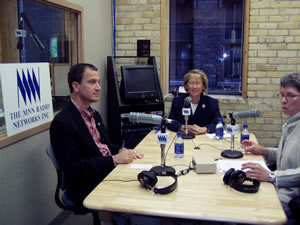Audio
Photos
More from MPR
Your Voice
| ||||||||||||||||||||||||||||||||||||||||||||||
Kennedy, Wetterling debate issues in 6th District race
October 4, 2004
 |
| Rep. Mark Kennedy, left, and challenger Patty Wetterling, center, debated the issues on Sunday. (MPR Photo/Tom Scheck) |
Minneapolis, Minn. — The half hour in-studio debate was hosted by the Minnesota News Network and cosponsored by the senior organization AARP of Minnesota. It showcased the major differences between the two candidates. In fact, one of the only things the two agreed on was that they both oppose reinstating the military draft.
In terms of the war in Iraq, Patty Wetterling says there should be a greater international presence in Iraq so U.S. troops aren't doing the brunt of the work in that country.
"The Iraqi people do not believe that this is truly their government when mostly what they see is American troops. We need to support our troops and make sure that we can to do everything possible for their safety and we need to bring in some international support. We need our allies troops in there so they can see an international presence and they can understand and believe that this can be their government," she said.
But Republican Congressman Mark Kennedy says he believes the U.S. should "stay the course." He says the wars in Iraq and Afghanistan are part of the overall war on terrorism.
"I also reject the idea that somehow Iraq is different than the war on terrorism. What we need to do to defeat terrorism is not just look at the blossoms like Al Qaeda, but the root which is the hopelessness that happens when you don't have a say in your government, when you don't have a economy to provide an opportunity for your children. Making sure that we have political freedom in Iraq is going to give us that hope and is going to ultimately defeat terrorism," he said.
On the issue of prescription drugs, Wetterling says she believes the federal government should allow seniors to import drugs from Canada. Kennedy says he doesn't support reimportation unless the federal government can ensure the safety of the drug supply.
On the Medicare prescription drug bill, Wetterling says she thinks Congress should allow the federal government to negotiate drug prices on behalf of Medicare recipients. Current law forbids the federal government from negotiating. Instead, private HMOs and other groups will negotiate those discounts.
"I can't imagine any other situation where the United States chooses to vote to not allow ourselves, the government to negotiate prices on anything. It was just a very poor decision," Wetterling said.
"I would say Minnesota seniors deserve more than just a Web site address and a bus ticket to Canada. They deserve a comprehensive prescription drug plan and that's what we passed," Kennedy countered.
Congressman Kennedy says the Medicare bill, while not perfect, is a good first step to helping low-income seniors pay for prescription drugs. He also believes that private insurers can negotiate better prices than the federal government.
"The non-partisan Congressional Budget Office estimates that we will achieve lower drug costs in the plan with multiple health care plans negotiating with the drug companies than you would and that you are getting in Medicaid in the government negotiated best price option," he said.
Both candidates also disagree on Social Security. By 2018, it's estimated that Social Security's obligations will start exceeding its costs.
Congressman Kennedy says he supports a system that would give younger workers the option to invest a portion of their taxes in the stock market. Kennedy says such a plan would not impact seniors or baby boomers who are approaching retirement age.
"If you talk to the youth today, they think it's more likely that they're going to see a martian spaceship than their going to get anything from social security. Give them a voluntary option that they can choose to make sure it's there for them. Those are the things that I think we need to look at," according to Kennedy.
"I do not support privatization," Wetterling said. "I think it puts those dollars at risk."
Wetterling says she does not support investing any Social Security money in the stock market. She also opposes raising the retirement age or cutting benefits to the program.
"We need to maintain its integrity. This is honoring the promise to the people who paid into Social Security that those dollars will be there when they need them."
Wetterling did not offer a solution on how she would keep Social Security solvent.
The two will meet for another debate this Saturday in St. Cloud.
|
News Headlines
|
Related Subjects
|

